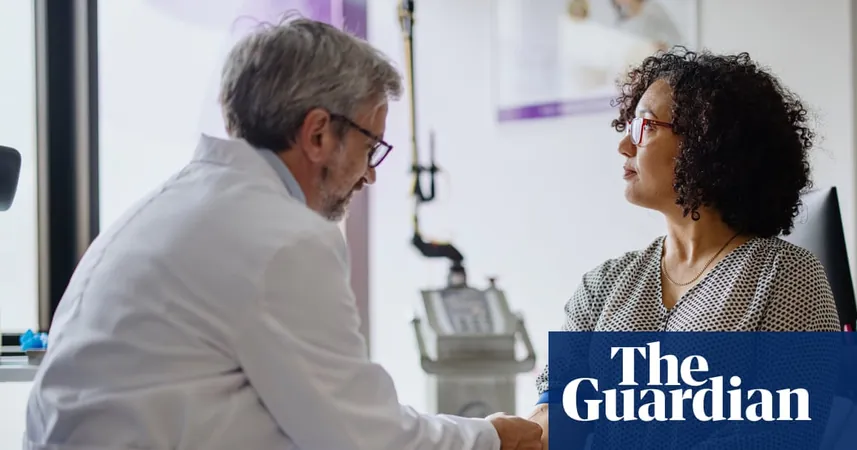
Are Private Menopause Tests Undermining NHS Care? Experts Weigh In!
2025-09-07
Author: Wei
In a growing trend, expensive over-the-counter hormone tests for menopause are raising eyebrows among healthcare professionals who warn these tests could be detrimental to women's health.
Offered by private clinics and available for self-testing, these kits promise to provide personalized insights by measuring hormone levels. However, experts are calling them misleading and unnecessary.
Dr. Stephanie Sterry, who recently co-authored a significant editorial titled "Menopause Misinformation is Harming Care," stated, "There are numerous private healthcare providers and telehealth clinics promoting these tests, along with an army of untrained individuals on social media pushing for their use."
Dr. Sterry emphasized that these tests lack evidence-based backing and offer no additional information to enhance treatment. "They're simply encouraging women to spend hundreds of pounds on tests that don't contribute to their care," she added.
In the UK, two primary types of menopause hormone kits are available: rapid urine-based tests—which claim to deliver results in just two minutes—and finger-prick blood tests that require lab analysis but promise results in one to two days. While urine tests retail for around £8 in high street shops like Asda and Superdrug, blood tests range drastically from £32 to £189.
Medical guidelines from organizations like NICE and the British Menopause Society concur that menopause should be diagnosed solely on symptoms for women over 45. Experts assert that fluctuating hormone levels provide no reliable diagnostic value.
Dr. Sterry noted, "These tests are marketed as essential for 'individualizing' hormone therapy, yet their clinical utility is limited. There's no established therapeutic window for menopausal hormone therapy, rendering many testing techniques inaccurate."
Both Dr. Paula Briggs from the British Menopause Society and Dr. Susanna Unsworth, a menopause specialist, share concerns over the tests, calling them harmful and a growing issue in women's healthcare.
Dr. Briggs stated, "Women are developing unrealistic expectations about hormone replacement therapy (HRT), particularly concerning mental illness and the notion of a 'quick fix,' leading to the rise of unregulated, expensive treatments like bioidentical hormones." She advocated for NHS-led, collaborative care and expressed concern over the commercialization of women's health.
Dr. Unsworth corroborated the adverse effects of these tests, sharing, "Patients often ask if they need tests before their appointment. I usually say no, yet many arrive with extensive results they've personally organized. Unfortunately, most of these results lack meaningful interpretation, creating challenges in patient trust and care.”
In defense of these tests, Dr. Martin Thornton from Bluecrest Clinic claimed they empower women by correlating symptoms with data. However, Dr. Sterry countered that there's no evidence linking symptoms of perimenopause to blood test results, potentially leading to confusion and inadequate treatment.
Dr. Sterry concluded, "The principle of evidence-based practice dictates that tests should guide patient treatment. Hormone testing in menopause lacks supportive evidence and doesn't enhance care. Treatment should hinge on a patient’s individual symptoms, not numerical values."
When approached for comment, Superdrug asserted that the introduction of their FSH test was in response to customer feedback, claiming it comes with tailored medical advice based on both assessment answers and the test result.


 Brasil (PT)
Brasil (PT)
 Canada (EN)
Canada (EN)
 Chile (ES)
Chile (ES)
 Česko (CS)
Česko (CS)
 대한민국 (KO)
대한민국 (KO)
 España (ES)
España (ES)
 France (FR)
France (FR)
 Hong Kong (EN)
Hong Kong (EN)
 Italia (IT)
Italia (IT)
 日本 (JA)
日本 (JA)
 Magyarország (HU)
Magyarország (HU)
 Norge (NO)
Norge (NO)
 Polska (PL)
Polska (PL)
 Schweiz (DE)
Schweiz (DE)
 Singapore (EN)
Singapore (EN)
 Sverige (SV)
Sverige (SV)
 Suomi (FI)
Suomi (FI)
 Türkiye (TR)
Türkiye (TR)
 الإمارات العربية المتحدة (AR)
الإمارات العربية المتحدة (AR)